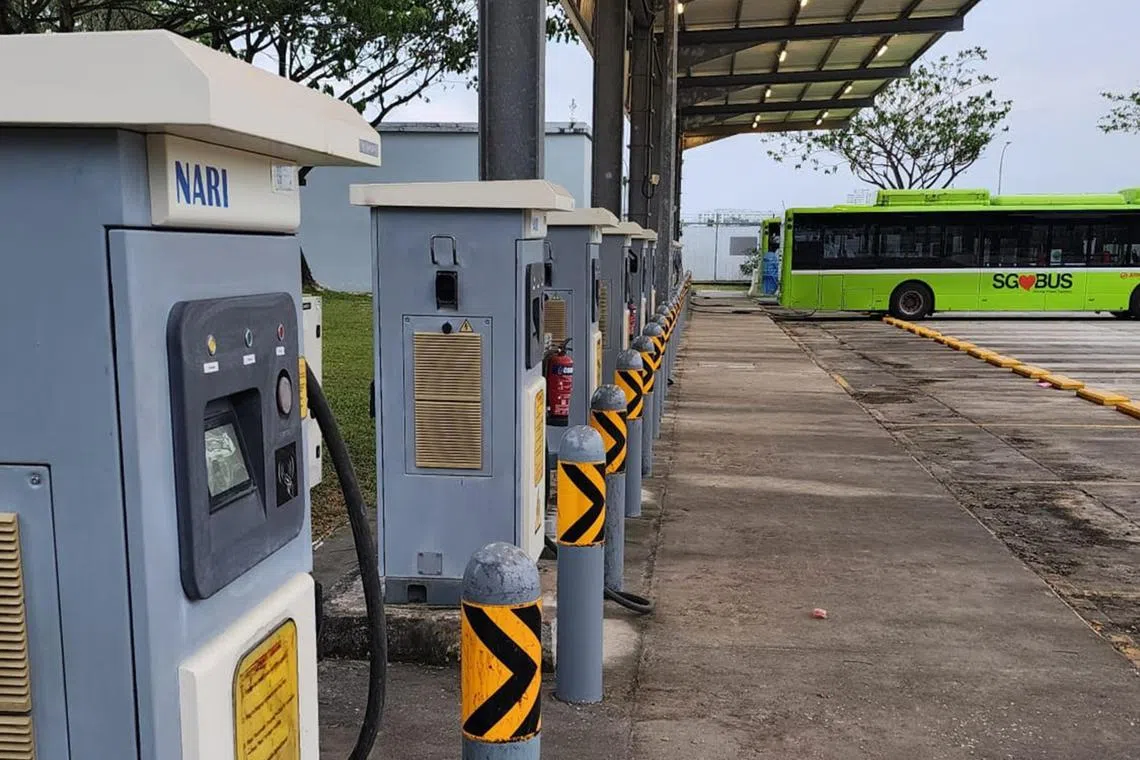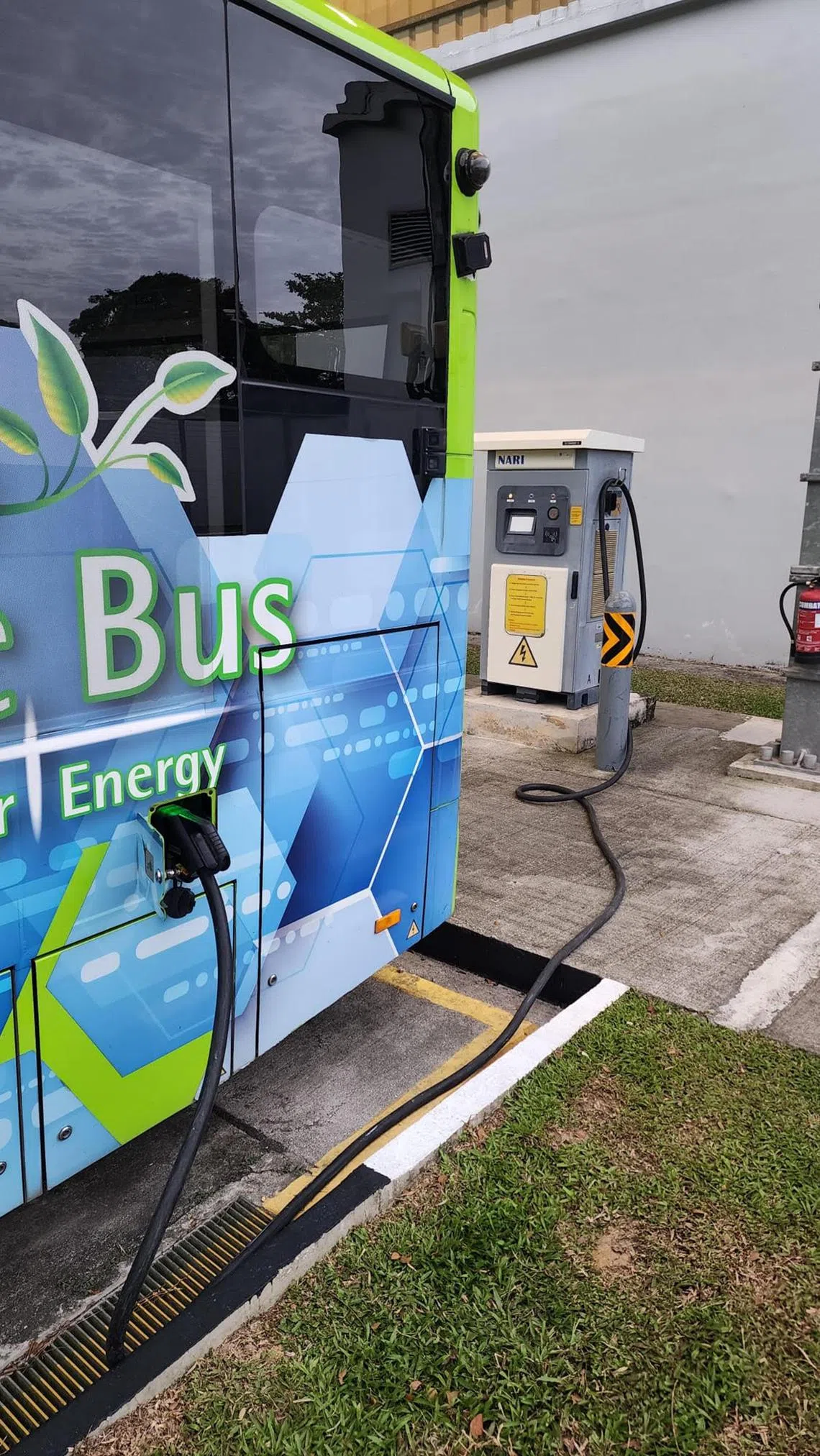Private electric buses using chargers in Bulim public bus depot in trial
Sign up now: Get ST's newsletters delivered to your inbox

The trial is meant to assess if the chargers at the depot can be efficiently used by private operators when they are not needed by the public buses.
PHOTO: TOWER TRANSIT
SINGAPORE – Two private bus companies are using the electric vehicle (EV) chargers located within a bus depot operated by Tower Transit under a small-scale trial, as operators iron out kinks over where and how to charge larger vehicles.
For six months, Leisure Frontier and Tong Tar Transport can use the EV chargers at Bulim Bus Depot in Jurong West when they are not being used by Tower Transit’s public buses. Tong Tar began using them in February, and Leisure Frontier is expecting to start by end-March.
The Land Transport Authority (LTA) said the trial is meant to assess if the chargers at the depot can be efficiently used by private operators when they are not needed for public buses.
Public buses are usually charged at night when they are no longer running, said an LTA spokesperson.
As the chargers are inside the depot, the private bus drivers must undergo safety protocol training before they can enter the premises, where Tower Transit has a workshop to maintain its vehicles.
The lack of charging infrastructure is a concern for private bus companies considering the switch to EVs from diesel vehicles. So far, efforts to build up Singapore’s EV charging infrastructure have been concentrated on private cars.
Mr Terence Ng, managing director of Leisure Frontier, said the company’s location in Woodlands Industrial Park E does not have sufficient power to support EV chargers.
Instead, its fleet of five electric buses – a sixth is on the way – has to rely on third-party charging service operators, including high-speed chargers located on the fifth floor of a multi-storey industrial building in the Woodlands industrial area that were set up by Shell and Busways, an engineering firm.
While Leisure Frontier’s two smaller 13-seater Foton buses can use the same EV chargers at carparks for private cars, its three larger electric buses with 23 or more seats have only a handful of places to turn to due to their size.
The private bus companies transport students and workers, and run shuttle services and chartered services such as tours.
Tong Tar Transport has one charger at its own compound in Soon Lee Road in the Pioneer district. The operator has three electric buses, with another 12 on the way.
Both bus companies said they decided to buy electric buses in spite of the inconvenience and higher cost because they want to learn how to work with such vehicles. They expect EVs to eventually become the norm for their businesses in the future, replacing the diesel buses that dominate their current fleets.
Although there are no deadlines for private buses to be electric, Singapore wants half of the public bus fleet to be electrified by 2030. By 2040, public buses can be only EVs or hybrid-electric.
Besides considering the different maintenance requirements, the companies must also modify bus deployments around the charging needs, including where the chargers are located and how far the electric buses can travel before they need to be charged.
An electric bus can cost between $450,000 and $600,000, compared with a diesel alternative at around $270,000. Unlike with electric private cars and light commercial vehicles, there are no tax incentives to buy large electric buses over diesel options.
The latest generation of electric buses are claimed to be able to travel up to 400km on a full charge. In reality, the operators plug in the buses to charge at every available opportunity rather than wait until the batteries are completely flat.
Heavy vehicles, such as large buses, can be parked only in dedicated heavy vehicle parks.
Bus companies normally apply for season parking in locations that are as near as possible to where the designated driver lives to save them a long trip to get to their buses. However, such heavy vehicle parks do not have EV chargers.

An electric bus can cost between $450,000 and $600,000, compared with a diesel alternative at around $270,000.
PHOTO: TOWER TRANSIT
Some private bus companies are able to install chargers at their own locations, but it depends on factors such as whether there is sufficient power for the chargers and enough years left in their property leases to justify the investment.
According to the latest available data as at Feb 29, 257 buses, or 1.4 per cent of the population of 17,916 buses in Singapore, are fully electric. This is up from 0.9 per cent in 2023.
Separately, Tower Transit is using five 19-seater electric buses for service 825, a shuttle service from the Yio Chu Kang interchange serving parts of Ang Mo Kio and the Lentor area.
Tower Transit’s spokesman said the buses, which are nearly 5m shorter than typical public buses, are better suited to navigate the narrower roads. The smaller capacity also suits the lower demand for the route. These electric buses are charged at Mandai Bus Depot, which has two EV chargers.



